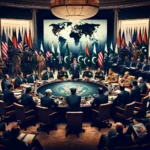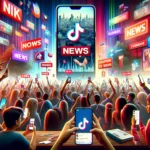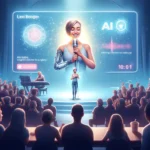Scarlett Johansson, a Hollywood powerhouse known for her captivating performances, has stepped outside the realm of fiction and into the very real conversation surrounding Artificial Intelligence (AI). Her recent comments highlight a growing concern – the potential dangers of AI and humanity’s vulnerability to its unfettered development.
Johansson’s experience isn’t purely academic. She took legal action against an app that used her likeness and voice without permission, a disturbing example of how AI can be misused. This personal encounter likely fueled her public statements, urging for caution and responsible development.
“We’re all waiting,” she said, “and supporting [the development of AI]. Like, obviously. But I think you know, it’s yeah, we’re like still waiting for, and supporting,
like the passing of legislation to protect everybody’s rights.”
Her call for legislation reflects a broader anxiety. As AI becomes more sophisticated and integrated into daily life, questions about bias, privacy, and even job displacement become increasingly pressing.
One major concern is algorithmic bias. AI systems trained on biased data can perpetuate those biases in their outputs. Imagine a hiring AI that inadvertently filters out qualified candidates based on factors like gender or race, simply because the data it was trained on reflected existing societal biases.
Privacy is another critical issue. AI systems collect and analyze vast amounts of data, raising concerns about how this data is used and secured. Imagine a world where your every move, every purchase, and every online interaction is monitored and analyzed by AI. The potential for manipulation and control becomes uncomfortably real.
Perhaps the most talked-about danger is job displacement. As AI becomes more adept at repetitive tasks, many fear widespread unemployment. While AI undoubtedly creates new jobs, the transition period could be devastating for those whose skills become obsolete.
Johansson’s voice joins a growing chorus of experts and public figures calling for responsible AI development. Elon Musk, for instance, has expressed his belief that AI poses an existential threat to humanity. While his views might be considered extreme, they underscore the seriousness of the conversation.
What Can Be Done?
Regulation: Legislation needs to be established to ensure ethical AI development. This could involve setting standards for data collection, use, and security. Regulations could also address issues of bias and transparency.
Education: Educating the public about AI is crucial. People need to understand how AI works, its potential benefits and drawbacks, and the ethical considerations involved.
Collaboration: Open communication and collaboration between developers, policymakers, and the public are essential. This ensures that AI development remains aligned with human values and societal needs.
Ultimately, AI represents a powerful tool with immense potential for good. From revolutionizing healthcare to streamlining everyday tasks, the benefits are undeniable. However, as with any powerful tool, safeguards are necessary to ensure it’s used responsibly.
Johansson’s call to action reminds us that AI advancement shouldn’t be a passive process. By actively engaging in discussions and demanding responsible development, we can ensure AI becomes a force for progress, not a threat to our future.







